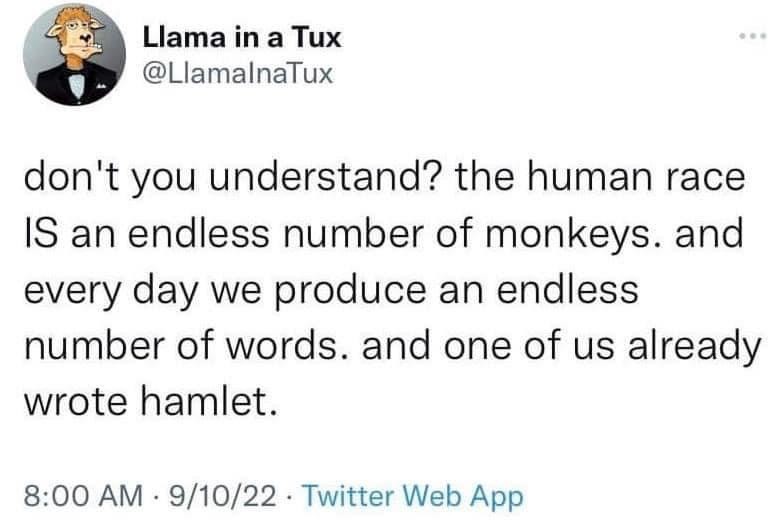this post was submitted on 29 Oct 2023
946 points (98.2% liked)
People Twitter
5189 readers
2119 users here now
People tweeting stuff. We allow tweets from anyone.
RULES:
- Mark NSFW content.
- No doxxing people.
- Must be a tweet or similar
- No bullying or international politcs
- Be excellent to each other.
founded 1 year ago
MODERATORS
you are viewing a single comment's thread
view the rest of the comments
view the rest of the comments

While sure it's a funny joke, it also kind of misses the point of the original analogy. The monkeys are intended to be stand ins for entirely random inputs, which Shakespeare, and the human species as a whole, is not.
But to get Shakespeare it was random, all the wars and plagues and volcanic eruptions and his ancestors moving around the country and him being born in a time where writing plays was a viable career
Yeah but the odds are only meaningful if someone was expecting Hamlett specifically to get written in the first place. Without that it ceases to be a significant event, and reduces to merely the event that happened. Just because one arrangement of molecules is unique doesn't mean it's special if any number of other arrangements is functionally the same. The same argument applies to any person. Yeah the odds of you in particular being born are astronomical, but that doesn't make you special, because if it wasn't you it would have been someone substantially similar to you. After all, your parents were making a baby either way.
That's the point of the thought experiment. With enough time, all events with non zero probability will happen. The monkey that writes Hamlet isn't any less likely or more impressive than the monkey than writes a unique set of complete jibberish.
Those won't random acts though. They were decisions and actions from outside inputs. If you had enough data you could recreate the events from the big bang onwards in theory. Assuming human decision making is deterministic.
Random in this case means random as in if a particle decays or not. Not simply harder to predict as in human behaviour.
Yeah in what reality is the history of language "random"?
Go back far enough back and sure it was